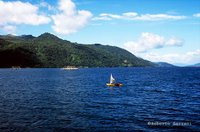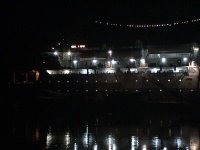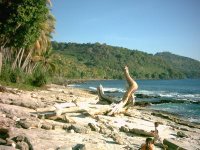Alor Island is the last group of islands in the far eastern end of the Solor-Alor archipelago. It is about 65 kilometers from Timor Island. East Timor can easily be seen from the beach in Kolana, east Alor Island. The island archipelago consists of 15 islands. The largest inhabited island is Alor Island, followed by Pantar Island, Pura Island, Ternate Island, Treweng Island, Buaya Island, Kangge Island, and Kepa Island.
According to the latest consensus there are about more tahn 200.000 people currently living on Alor, of which the majority -75 %- are Protestant, the rest are almost all Muslim, only a few villages have the Catholic faith. Nevertheless spiritual belief and traditions are still strong.
Alor is one of the 14 regencies in the province Nusa Tengarra Timur. It consists of 9 sub-districts and 158 villages. The head of the local government is the Bupati.
The regional government is seated in Kalabahi, the one and only town on the Alor islands. All the main commercial and administrative activities take place in Kalabahi. According to estimations about 60.000 people live in and around Kalabahi.
Linguistically Alor is remarkably diverse, according to a recent survey by the Leiden University in Holland; there are approximately 14 different languages on the Alor islands. Most of these languages are related to Papuan languages, except the language spoken by some fishing communities, which is commonly referred to as bahasa Alor or more correctly bahasa Lamaholot. This is an Austronesian language and is related to languages spoken in East-Flores. (For more infomation about Linguistic variation on Alor visit: www.letleidenuniv.nl/aapp/alor.html )
The Alor islands were formed by volcanic activity and are very rough and jagged. Kalabahi is one of the only large flat areas on Alor. This is also the reason why the colonial Dutch government decided to move the capital and main port from Alor- Kecil to Kalabahi in 1911.
Agriculture still dominates the economic structure of Alor. Nevertheless the contribution of the agricultural sector to the island’s economy is still relatively small. Much of the farming is traditional subsistence farming where the products of the lands are used for own consumption. Other aspects are that the market prices are very low, the infrastructure is poor, and that there is little knowledge of other farming techniques.
However, the local government is trying to improve the infrastructure and agricultural input to the local economy, in cooperation with partner organizations. New cash crops and farming techniques are being introduced, some with remarkable results. A good example is the village of Apui, where some high quality vanilla is being produced.
Slowly but steadily Alor is gaining a position on the regional and international market, products such as turmeric, seaweed, tamarind, candlenut, sandalwood and cloves are finding their way to ports all over Republic of Indonesia. Some examples of Alorese products that are on the international market are black pebbles, vanilla, seed lack and pearls.
Despite being far away from international trade centers and seaports, Alor lies right next to East-Timor. Historically Alor and East-Timor have always been close neighbors, it is hoped that soon old trade relations and export links can soon be re-established. This reunion could have enormous economical opportunities for both islands.
sources :
photos :














